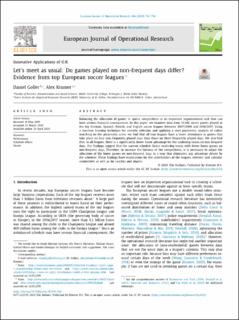Let's meet as usual : Do games played on non-frequent days differ? : Evidence from top European soccer leagues
Peer reviewed, Journal article
Published version

View/
Date
2020Metadata
Show full item recordCollections
- Artikler [407]
- Publikasjoner fra Cristin [424]
Original version
European Journal of Operational Research. 2020, 286 (2), 740-754. 10.1016/j.ejor.2020.03.062Abstract
Balancing the allocation of games in sports competitions is an important organizational task that can have serious financial consequences. In this paper, we examine data from 10,142 soccer games played in the top German, Spanish, French, and English soccer leagues between 2007/2008 and 2016/2017. Using a machine learning technique for variable selection and applying a semi-parametric analysis of radius matching on the propensity score, we find that all four leagues have a lower attendance in games that take place on four non-frequently played days than those on three frequently played days. We also find that, in all leagues, there is a significantly lower home advantage for the underdog teams on non-frequent days. Our findings suggest that the current schedule favors underdog teams with fewer home games on non-frequent days. Therefore, to increase the fairness of the competitions, it is necessary to adjust the allocation of the home games on non-frequent days in a way that eliminates any advantage driven by the schedule. These findings have implications for the stakeholders of the leagues, referees’ and calendar committees as well as for coaches and players. Keywords: performance, schedule effects, soccer
